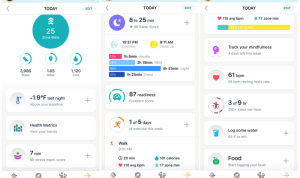Top 10 Best-Selling Smartphones of 2025 and Where to Buy Them Online offers an exciting glimpse into the latest trends in mobile technology. As we step into a new era of innovation, 2025 has witnessed a remarkable array of smartphones that cater to diverse needs and preferences. From cutting-edge features to sleek designs, this list not only highlights the best sellers but also guides you on where to snag these devices online.
With technology evolving at a rapid pace, the competition among smartphone manufacturers has intensified, resulting in devices that are more powerful and user-friendly than ever. Consumers have a lot to consider, from battery life to camera quality, making it essential to stay informed about the top picks of the year and the best platforms for purchasing them.
In the ever-evolving landscape of technology, the role of artificial intelligence (AI) has become increasingly significant. From automating mundane tasks to providing insights that were previously unimaginable, AI is reshaping industries across the globe. In this article, we will explore the various facets of AI, examining its applications, benefits, challenges, and the future it holds for society.Understanding AI: A Brief OverviewArtificial intelligence refers to the simulation of human intelligence in machines programmed to think and learn like humans.
This includes learning from experiences, recognizing patterns, and making decisions. The concept of AI isn’t new; it has been around since the mid-20th century. However, recent advancements in computational power and data availability have propelled AI into the limelight.AI is often categorized into two main types: Narrow AI and General AI. Narrow AI, also known as Weak AI, is designed to perform a specific task, such as voice recognition or image analysis.
In contrast, General AI, or Strong AI, refers to machines that possess the ability to perform any intellectual task that a human can do. While we have made significant strides in Narrow AI, General AI remains a concept that is still largely theoretical. Applications of AI Across Industries AI’s versatility allows it to be integrated into a variety of sectors. Here are some prominent industries where AI is making a significant impact:
Healthcare AI is revolutionizing healthcare with applications that range from diagnostic tools to personalized medicine. Machine learning algorithms can analyze vast amounts of medical data, helping doctors in diagnosing diseases more accurately and promptly. For instance, AI-powered imaging tools can detect anomalies in radiology scans, leading to earlier interventions and better patient outcomes.FinanceIn the financial sector, AI is enhancing risk assessment and fraud detection.
Algorithms can analyze transaction patterns in real time, identifying suspicious activity that may indicate fraud. Additionally, robo-advisors utilize AI to offer personalized investment advice, making financial planning more accessible to individuals.RetailRetailers are employing AI to enhance customer experiences and optimize inventory management. Through data analysis, AI can predict consumer behavior, enabling businesses to tailor their marketing strategies effectively.
Chatbots powered by AI also improve customer service by providing instant responses to inquiries. TransportationThe transportation industry is undergoing a transformation with the advent of autonomous vehicles. AI plays a central role in enabling cars to navigate safely and efficiently. Companies like Tesla and Waymo are leading the charge in developing self-driving technology that promises to reduce accidents and traffic congestion.
EntertainmentAI is reshaping the entertainment industry by recommending content tailored to individual preferences. Streaming services such as Netflix and Spotify leverage AI algorithms to analyze user behavior and suggest shows or songs that align with their tastes, enhancing user engagement.Benefits of AIThe integration of AI into various sectors yields numerous advantages, including:
Increased Efficiency
AI can perform repetitive tasks faster and with fewer errors than humans, leading to increased productivity across industries.
Enhanced Decision-Making
By analyzing large datasets, AI can provide insights that assist in making informed decisions, minimizing risks and optimizing outcomes.
Cost Savings
Automating tasks through AI can significantly reduce labor costs and operational expenses.
Innovation
AI fosters innovation by enabling the development of new products and services that were previously not possible. Challenges and Ethical ConsiderationsDespite its numerous benefits, the deployment of AI is not without challenges. Some key concerns include: Job DisplacementAs AI systems become more capable, there is a growing fear that they will replace human jobs. While AI can enhance productivity, it also raises questions about the future of work and the need for retraining workers displaced by automation.
Privacy IssuesThe use of AI often involves the collection and analysis of vast amounts of personal data. This raises concerns about privacy and data security, particularly if sensitive information is mishandled or misused. Bias and DiscriminationAI systems are only as good as the data they are trained on. If the training data contains biases, the AI can perpetuate and even amplify these biases in its decision-making processes.
This highlights the importance of ensuring diversity and fairness in AI development. Lack of AccountabilityAs AI systems make more decisions independently, determining accountability for errors or unintended consequences becomes increasingly complex. Establishing clear guidelines and regulations is essential to address these challenges. The Future of AILooking ahead, the potential for AI is vast. As technology continues to advance, we can expect to see even more innovative applications of AI across various fields.

Some trends that are likely to shape the future of AI include:
Increased Collaboration Between Humans and AI
Rather than replacing humans, AI is expected to augment human capabilities, leading to more effective collaboration in the workplace.
Advancements in Natural Language Processing (NLP)
Improvements in NLP will enhance human-computer interactions, making it easier for users to communicate with machines.
Ethical AI Development
As awareness of ethical considerations grows, there will be a greater emphasis on developing AI systems that are transparent, fair, and accountable.
AI in Education
Smartphones of 2025 Personalized learning experiences powered by AI can revolutionize the education sector, catering to the unique needs of each student. Conclusion Artificial intelligence is undoubtedly one of the most transformative technologies of our time. Its applications span across various industries, providing benefits that enhance efficiency, decision-making, and innovation. However, it is crucial to address the challenges and ethical considerations that accompany its deployment.
By fostering collaboration between humans and AI, and prioritizing ethical development, we can harness the full potential of AI to create a better future for all.As we navigate this fascinating landscape, it is essential to remain informed and engaged in discussions about the implications of AI in our lives. The journey of AI has just begun, and its impact will shape the fabric of our society for generations to come.










